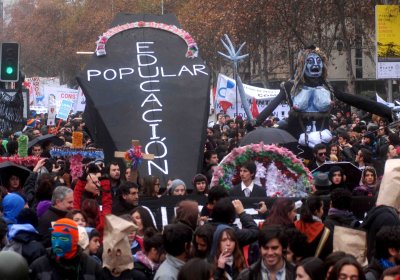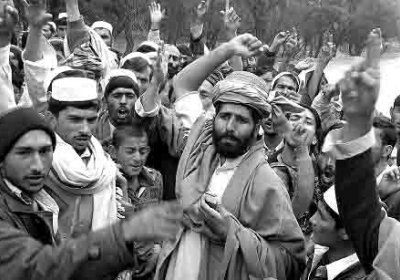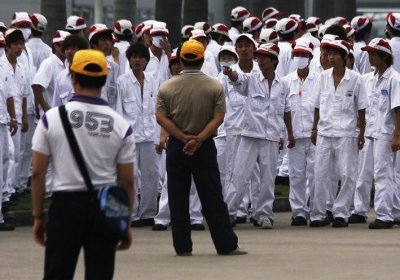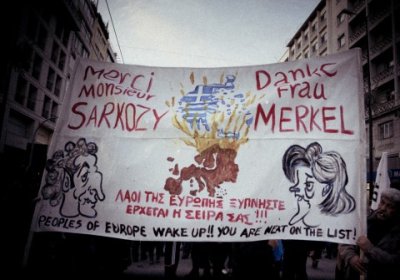Politically progressive post-hardcore band Enter Shikari say they only have to look at their fans to get a sense that the world can change for the better. “The past few years we've seen a huge increase in people that come up and thank us for singing about the things we do,” Rou Reynolds, frontman of the British band, tells Green Left Weekly.
911
Panic
By David Marr
Black Inc., 2011
262 pages, $29.95 (pb)
Panic. “It’s so Australian,” says the dejected journalist, David Marr in his book of essays on the rise, decline and rise again of political panics in Australia.
Panic over the Chinese was the “midwife of Federation”, and subsequent alarms about German spies in World War I, Wobblies and Reds in the 1920s, Communists in the Depression, and the Red Menace all over again after World War II have kept the scares coming.
Nyoongar activists and their supporters refused to leave Perth’s Heirisson Island on February 19 when a squad of armed police arrived to evict them.
A United Nations Security Council (UNSC) motion condemning the Syrian regime's bloodshed and caling for a “transition to democracy” was vetoed on February 4 by Russia and China.
United States officials condemned the move as “disgusting and shameful” and a “travesty”.
The moral outrage expressed by the US was faithfully reported by the corporate Western media, which paid little attention to Washington’s own voting record in the UNSC.
By Barry Healy Which Side Are You On? is Veteran United States indie folk artist Ani DiFranco’s first CD release in years and her legion of fans will be pleased to hear that she has lost none of her edge.
Huge student protests that broke out last year gave a tremendous jolt to Chilean society, as reflected even by public opinion polls.
When La Nacion asked a group of poll takers to name the best thing about 2011, 63% answered the student and environment mobilisations, compared with just 17% who chose the University of Chile soccer team, which won the South American cup at the end of November.
Just 3% chose the Cervantes Prize, the big Spanish-language literary prize, which was awarded to Chilean writer Nicanor Parra.
The US-led international occupation force in Afghanistan (ISAF) is in the country to fight the Taliban as the ally of the Afghan state headed by President Hamid Karzai.
The ISAF’s primary mission is training and mentoring the Afghan government forces so they can take over the fight, allowing the foreign forces to leave.
That is the official story.
But casualties suffered by ISAF soldiers are increasingly being inflicted not by the Taliban but by the soldiers they are meant to be mentoring.
Six Zimbabwean socialists are charged with “inciting public violence” (which carries a maximum penalty of 10 years’ imprisonment). They were arrested on February 19 while meeting to watch video footage of democracy protests in Egypt and Tunisia. The February 16 letter from Zimbabwe below explains the latest developments.
* * *
Working class struggle is an important part of modern Chinese history, and is rising
In a late industrialising country, the Chinese working class emerged and became organised only in the early 20th century after the country was forced to open up to global capitalism.
However, shaped by harsh economic exploitation and foreign semi-colonial domination, China’s working class quickly established itself in the space of a few decades. This culminated in mass protests and strikes between 1925 and 1927.
Hundreds of thousands protested around the Athens parliament on February 12. Tens of thousands protested in Thessaloniki, the country's second biggest city, and sizeable protests took place in other Greek cities. The rallies followed a 48-hour strike over February 10-11.
The Cuban Institute of Friendship with the Peoples is inviting all friends of Cuba to join the sixth International Brigade of Volunteer Work and Solidarity with Cuba this May Day.
The brigade runs from April 22 to May 6 this year. It aims to provide a wider understanding of Cuban reality and carry out volunteer work to support agricultural development in Cuba.
The 15-day program includes visits to historical, economic, cultural and social places in Havana and the provinces of Artemisa and Pinar del Rio.
A new twist in the turbulent saga surrounding a proposed roadway through indigenous land has reignited a debate raging throughout Bolivia since the middle of last year.
The controversial highway ― which would cut through the Isiboro-Secure National Park and Indigenous Territory (TIPNIS) ― has been at the centre of protests and counter-protests. It has polarised Bolivian society and divided indigenous groups that are the heart of the Evo Morales government’s social base.
- Page 1
- Next page








